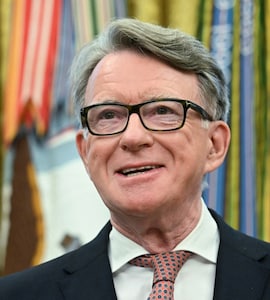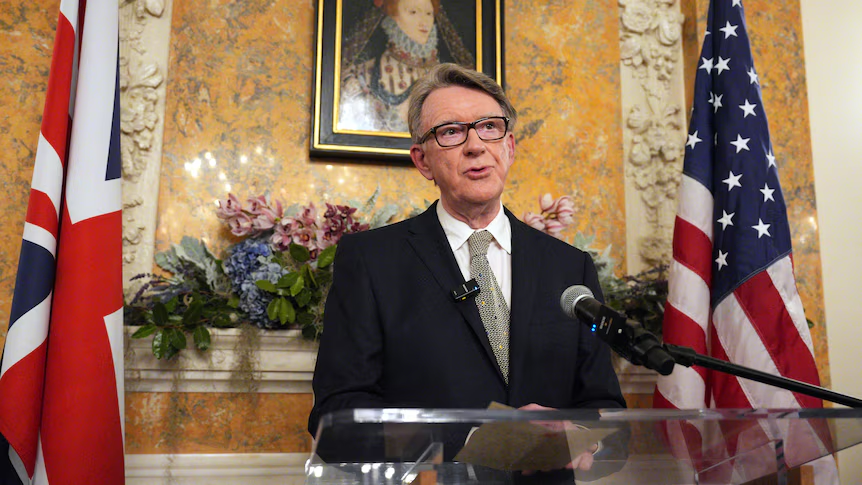Peter Mandelson is one of the most fascinating figures in British politics. Known as the “Prince of Darkness” by both admirers and critics, Mandelson played a crucial role in reshaping the UK’s Labour Party and turning it into a modern political force. Whether you view him as a genius strategist or a controversial spin doctor, there’s no denying his influence on late 20th and early 21st-century politics.
In this article, we’ll take a deep dive into Mandelson’s life, his career, his impact on Labour, and his enduring reputation as one of the most skilled political operators of his generation.
Early Life and Education

Peter Mandelson was born on October 21, 1953, in Hampstead, London. Peter Benjamin Mandelson Coming from a family that valued intellectual curiosity and social awareness, Mandelson’s early years shaped his sharp political instincts. His grandfather was Herbert Morrison, a well-known Labour politician and a key figure in Clement Attlee’s post-war government. Growing up in such a politically engaged family exposed Mandelson to the inner workings of politics at a young age.
Mandelson attended Hendon County Grammar School before going on to St Catherine’s College, Oxford, where he studied Philosophy, Politics, and Economics (PPE) — a popular degree for future politicians. At Oxford, he was already showing signs of political ambition, participating actively in student politics and debates. Peter Mandelson His time there not only sharpened his intellect but also connected him to a network of future political leaders and thinkers.
After Oxford, Mandelson briefly worked as a producer for London Weekend Television. Peter Benjamin Mandelson This experience in the media world would later become one of his strongest assets as he crafted Labour’s communications strategy. He understood the importance of controlling the narrative, framing political messages, and using television effectively — skills that would serve him and the Labour Party very well.
Entry into Politics
Peter Mandelson formal entry into politics came when he was appointed Director of Communications for the Labour Party in 1985. This was a challenging time for Labour, as the party had been out of power since 1979 and was struggling with internal divisions between its left-wing and moderate factions.
He played a key role in rebranding Labour’s image, focusing on making the party more electable. Peter Mandelson This period saw the early foundations of what would later become “New Labour,” a modernized, centrist version of the party designed to appeal to a broader section of the British public. Mandelson’s strategy was simple but effective — soften Labour’s image, embrace media-savvy messaging, and present a unified front to the electorate.
This communications overhaul started paying off as Labour became more competitive in elections. Mandelson’s understanding of branding, media relations, and public perception earned him a reputation as a brilliant strategist, though some traditional Labour members accused him of being too focused on style over substance.
The Birth of New Labour
The 1990s marked Mandelson’s most significant contribution to British politics: the creation of “New Labour.” Working alongside figures like Tony Blair and Gordon Brown, Mandelson helped craft a vision of the Labour Party that was pro-business, socially progressive, and focused on pragmatic solutions rather than ideological purity.
This rebranding was not just cosmetic — it represented a fundamental shift in Labour’s approach. Peter Mandelson Gone were the days of rigid socialist policies and trade union dominance. In their place came a new agenda that embraced free-market principles while promising social justice. Mandelson understood that for Labour to win, it had to appeal to middle-class voters who had abandoned the party in the Thatcher era.
The results spoke for themselves. In 1997, under Tony Blair’s leadership, Labour won a landslide victory, ending 18 years of Conservative rule. Mandelson, often referred to as one of the “founding fathers” of New Labour, was credited as one of the masterminds behind this historic success.
Ministerial Roles and Political Controversies
Peter Mandelson’s career was not without its share of controversies. Peter Mandelson He served in several key ministerial roles, including Secretary of State for Trade and Industry and Secretary of State for Northern Ireland. His time in government was marked by policy achievements, including his efforts to promote business growth, international trade, and the Northern Ireland peace process.
However, Mandelson twice resigned from the Cabinet due to controversies — first in 1998 over a home loan scandal, and again in 2001 over allegations relating to a passport application for an Indian businessman. Peter Mandelson Both times, he denied any wrongdoing, and many believed that his resignations were as much about political optics as about actual misconduct.
Despite these setbacks, Mandelson remained a key figure in Labour politics and made a dramatic comeback when Gordon Brown appointed him as Secretary of State for Business, Innovation, and Skills in 2008. This period coincided with the global financial crisis, and Mandelson was instrumental in crafting the government’s response to stabilize the economy.
Influence on Modern Politics
Even after leaving frontline politics, Mandelson’s influence continues to loom large. He has written books, delivered lectures, and offered political commentary that provides insights into the challenges facing modern social democratic movements. His deep understanding of strategy, communications, and party management makes him one of the most respected political minds in Britain.
Mandelson’s work has inspired a generation of political advisers and strategists who see him as the ultimate campaign manager. Whether one agrees with his centrist approach or not, it’s clear that he reshaped British politics in ways that are still felt today.
He also continues to be a trusted adviser behind the scenes, occasionally offering guidance to Labour Party leaders and policymakers. His knack for reading the political mood and understanding public sentiment is still considered unparalleled.
Legacy and Reputation
Peter Mandelson remains a polarizing figure — admired by some for his brilliance and criticized by others for his perceived manipulation of politics. His nickname, “The Prince of Darkness,” reflects this duality. Supporters argue that he brought Labour into the modern era, helping it reconnect with the electorate and deliver meaningful change. Critics claim he turned politics into a marketing exercise and prioritized optics over substance.
Regardless of where one stands, his contribution to British politics is undeniable. Peter Mandelson He turned the Labour Party from an unelectable opposition force into a governing party that held power for over a decade. Few political figures can claim such a lasting impact.
Today, Mandelson’s story is studied by political scientists, campaign managers, and historians as an example of how strategy, messaging, and leadership can transform a political movement.
Conclusion
Peter Mandelson’s career is a masterclass in political reinvention, strategy, and resilience. Peter Mandelson From his early days as Labour’s communications guru to his pivotal role in creating New Labour, Mandelson has been at the heart of some of the most significant political transformations in Britain’s recent history.
Love him or hate him, one thing is clear: Peter Mandelson changed the way British politics is fought and won. His legacy continues to shape political debates, campaign strategies, and the Labour Party’s direction to this day.

